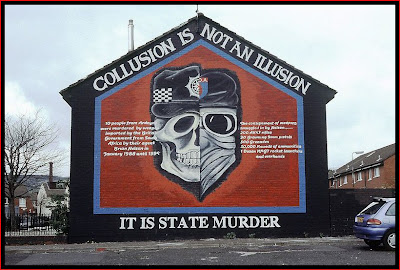Woman Decapitated In Mexico For Posting On Internet
MEXICO CITY — Police found a woman's decapitated body in a Mexican border city on Saturday, alongside a handwritten sign saying she was killed in retaliation for her postings on a social networking site.
The gruesome killing may be the third so far this month in which people in Nuevo Laredo were killed by a drug cartel for what they said on the internet.
Morelos Canseco, the interior secretary of northern Tamaulipas state, where Nuevo Laredo is located, identified the victim as Marisol Macias Castaneda, a newsroom manager for the Nuevo Laredo newspaper Primera Hora.
The newspaper has not confirmed that title, and an employee of the paper said Macias Castaneda held an administrative post, not a reporting job. The employee was not authorized to be quoted by name.
But it was apparently what the woman posted on the local social networking site, Nuevo Laredo en Vivo, or "Nuevo Laredo Live," rather than her role at the newspaper, that resulted in her killing.
The site prominently features tip hotlines for the Mexican army, navy and police, and includes a section for reporting the location of drug gang lookouts and drug sales points – possibly the information that angered the cartel.
The message found next to her body on the side of a main thoroughfare referred to the nickname the victim purportedly used on the site, "La Nena de Laredo," or "Laredo Girl." Her head was found placed on a large stone piling nearby.
"Nuevo Laredo en Vivo and social networking sites, I'm The Laredo Girl, and I'm here because of my reports, and yours," the message read. "For those who don't want to believe, this happened to me because of my actions, for believing in the army and the navy. Thank you for your attention, respectfully, Laredo Girl...ZZZZ."
The letter "Z" refers to the hyper-violent Zetas drug cartel, which is believed to dominate the city across from Laredo, Texas.
It was unclear how the killers found out her real identity.
By late Saturday, the chat room at Nuevo Laredo en Vivo was abuzz with fellow posters who said they knew the victim from her online postings, and railing against the Zetas, a gang founded by military deserters who have become known for mass killings and gruesome executions.
They described her as a frequent poster, who used a laptop or cell phone to send reports.
"Girl why didn't she buy a gun given that she was posting reports about the RatZZZ ... why didn't she buy a gun?" wrote one chat participant under the nickname "Gol."
Earlier this month, a man and a woman were found hanging dead from an overpass in Nuevo Laredo with a similar message threatening "this is what will happen" to internet users. However, it has not been clearly established whether the two had in fact ever posted any messages, or on what sites.
Residents of Mexican border cities often post under nicknames to report drug gang violence, because the posts allow a certain degree of anonymity.
Social media like local chat rooms and blogs, and networking sites like Twitter and Facebook, are often the only outlet for residents of violence-wracked cities to find out what areas to avoid because of ongoing drug cartel shootouts or attacks.
Local media outlets, whose journalists have been hit by killings, kidnappings and threats, are often too intimidated to report the violence.
Mexico's Human Rights Commission says eight journalists have been killed in Mexico this year and 74 since 2000. Other press groups cite lower numbers, and figures differ based on the definition of who is a journalist and whether the killings appeared to involve their professional work.
While helpful, social networking posts sometimes are inaccurate and can lead to chaotic situations in cities wracked by gang confrontations. In the Gulf coast state of Veracruz, just south of Tamaulipas, the state government dropped terrorism charges last week against two Twitter users for false posts that officials said caused panic and chaos in late August. HuffPo

































